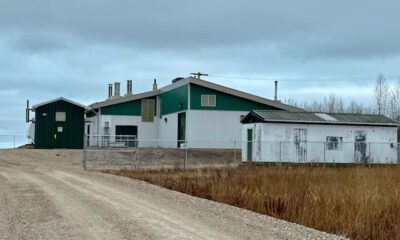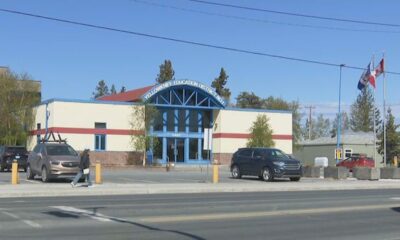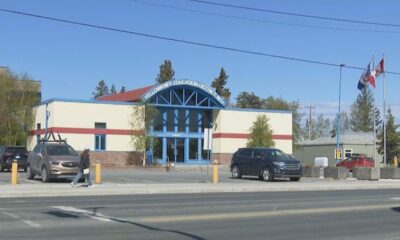Top Stories
Paulatuk Launches Urgent Energy Efficiency Initiative for Homes

UPDATE: The hamlet of Paulatuk, N.W.T. is taking bold steps to tackle drafty homes as part of its ambitious goal to achieve carbon neutrality. Community leaders and residents are uniting to address urgent housing inefficiencies that threaten to undermine their plans for renewable energy.
Residents are voicing their concerns about inadequate insulation and energy loss during harsh winters. Lily-Ann Green, a mother and member of the Paulatuk Energy Working Group, explains the pressing issue: “Many people in Paulatuk don’t have proper weather stripping on their doors and windows.” She highlights the struggle of keeping homes warm, stating that “we have to put a blanket up on the doorway… trying to keep our units as warm as we can.”
The urgency of these problems is underscored by a 2024 report from the N.W.T. Bureau of Statistics, which reveals that nearly 50% of homes in Paulatuk face a core need, meaning they are inadequate for residents. This places Paulatuk among the highest in the territory for housing challenges.
Families like Kourtney and Stacy Wolkie are directly affected. They have lived in their three-bedroom unit for nine years, waiting for essential repairs. “Needing to seal our drafty front door with silicone from October to May is a challenge,” Stacy says, stressing that it compromises safety during an emergency.
In response, the community is implementing the Sivulliit Energy plan, aiming to harness the region’s strong winds for renewable energy while ensuring homes are energy-efficient. Raymond Ruben, Paulatuk’s mayor, emphasizes the need for better housing, stating, “We want to help our local people have better homes. We’re not going to feed and waste energy on something that’s inefficient.”
The plan includes installing wind turbines, solar panels, and a battery storage system, but community leaders agree that without addressing housing inefficiencies, the renewable energy initiative will falter. Grace Nakimayak, the working group’s clean energy coordinator, highlights that the housing aspect of the plan is among its most critical components.
To gather data on energy use, the working group is collaborating with the National Research Council and the Northwest Territories Housing Corporation to install monitoring devices in select homes starting in Spring 2025. This data will guide recommendations to the territorial government for improved housing solutions.
Additionally, a housing and energy efficiency course is set to launch in Spring 2025, aimed at teaching residents ways to winterize their homes and reduce energy consumption. Nakimayak states, “We’ll be collaborating on how future builds could be more energy-efficient and culturally appropriate.”
Residents like Green are optimistic. “If people were given the tools and materials to help lower their power bills, I’m all for that. I’m excited for that to happen,” she says, reflecting the community’s hope for a greener, more sustainable future.
As Paulatuk moves forward with its energy efficiency initiative, the focus remains on ensuring that both renewable energy projects and housing improvements go hand in hand. Stay tuned for more updates as this critical project develops.
-

 Politics1 week ago
Politics1 week agoSecwepemc First Nation Seeks Aboriginal Title Over Kamloops Area
-

 World4 months ago
World4 months agoScientists Unearth Ancient Antarctic Ice to Unlock Climate Secrets
-

 Entertainment4 months ago
Entertainment4 months agoTrump and McCormick to Announce $70 Billion Energy Investments
-

 Lifestyle4 months ago
Lifestyle4 months agoTransLink Launches Food Truck Program to Boost Revenue in Vancouver
-

 Science4 months ago
Science4 months agoFour Astronauts Return to Earth After International Space Station Mission
-

 Technology3 months ago
Technology3 months agoApple Notes Enhances Functionality with Markdown Support in macOS 26
-

 Top Stories1 month ago
Top Stories1 month agoUrgent Update: Fatal Crash on Highway 99 Claims Life of Pitt Meadows Man
-

 Sports4 months ago
Sports4 months agoSearch Underway for Missing Hunter Amid Hokkaido Bear Emergency
-

 Politics3 months ago
Politics3 months agoUkrainian Tennis Star Elina Svitolina Faces Death Threats Online
-

 Politics4 months ago
Politics4 months agoCarney Engages First Nations Leaders at Development Law Summit
-

 Technology4 months ago
Technology4 months agoFrosthaven Launches Early Access on July 31, 2025
-

 Top Stories3 weeks ago
Top Stories3 weeks agoFamily Remembers Beverley Rowbotham 25 Years After Murder





















